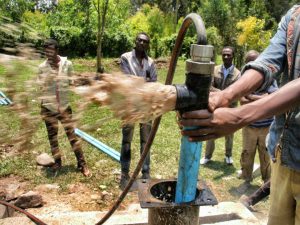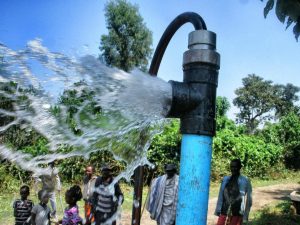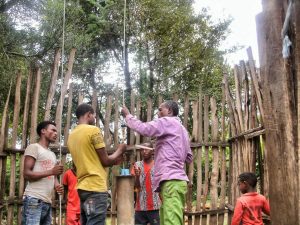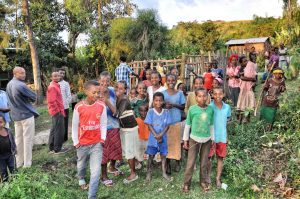This fantastic project to restore water to 5 villages in Wondo Genet, Ethiopia has been completed.
To read about the beginning of the project, CLICK HERE.
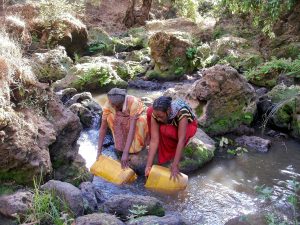 PROJECT BACKGROUND
PROJECT BACKGROUND
Wondo Genet Woreda (District) is located in the Sidama Zone of the Southern Nations, Nationalities, and Peoples’ Region (SNNPR) in southern Ethiopia. It is part of the Great Rift Valley and is bordered on the north and east by the Oromia Region. The District had an outbreak of dysentery in June 2016, attributed to contaminated drinking water. A cholera outbreak is affecting three associations with a population of nearly twenty thousand. The water source includes traditional unprotected sources such as springs and rivers as well and shallow hand-dug wells with water fetched with rope and bucket.
The clean water supply coverage of the district is low partly because of failed hand pumps. In June 2016, the District Water Bureau reported 60 broken pumps. In the absence of a clean water source nearby, women and children have to travel long distances to fetch water and this has a negative impact on the health and time management of women and children.
Poor hygiene and sanitation practices also contribute to the transmission of disease. Communities are not practicing proper disposal of excreta, hygienic handling of food substances and utensils, and management of animal wastes. An educational effort is needed to reinforce good behaviors that protect human health from disease outbreaks.
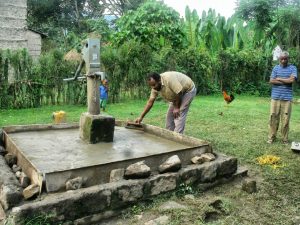 PROJECT SUMMARY
PROJECT SUMMARY
In order to address the great water needs and to play a role in combating the recent chronic dysentery outbreak in Wondo Genet, Water Charity & Water is Life International (WiLi) completed a project of 5 (five) well rehabilitations since August 2016. Well rehabilitations are a cost-effective way to recover clean water sources within a community. All of the wells that were rehabilitated were either not performing at all or seriously under-performing in terms of quality or yield. In all cases, the local community provided fencing materials and labor as needed for the rehabilitation process.
In addition to the hardware work that repaired the pumps, an educational process was conducted to increase responsibility and accountability for the continued maintenance of the pumps and to improve sanitation and hygiene practices. Water Use Committees (WUC) were formed for each well. The WUC is comprised of 4 women and 3 men elected from the community. They are encouraged to collect funds for the water to have a budget for future repairs. They also have been taught to be teachers in the community to promote practices such as washing hands and using latrines.
Village by Village Breakdown
|
Village |
Previous Condition |
Rehabilitation Intervention |
Direct Beneficiaries | ||
| Wuchale (Bure) | The well was not functioning for the last 6 months; They travel over 2 km round trip to get water from springs; pump units out of use and needs replacement. Wellhead concrete is broken
Water committee not formed |
The well was developed and cleaned; a new pump, riser main and PVC casing supplied & installed; and the pump head and adjustable handle restored. Wellhead reconstructed.
Water committee formed & WaSH training provided The well was disinfected with chlorine |
350 |
||
| Megenano | The well was not functioning for 9 months; pump unit, rod & PVC beyond repairable; wellhead shattered and requires; travel far to fetch from spring sources rehabilitation | The well was developed and cleaned; rod and PVC casing supplied & installed, and wellhead rehabilitated.
WUC strengthened & WaSh training provided The well disinfected with chlorine |
357 |
||
| Lomiche 2nd | The well was not functioning for the last 6 months; getting water from springs took women & children 40 minutes (round trip); damaged parts: rod, PVC, seal & bushings
Wellhead broken & WUC weakened; Sanitation & hygiene awareness low |
The well was developed, cleaned, and broken parts of the pump repaired. Wellhead refurbished
WUC strengthened & WaSH training provided The well disinfected with chlorine |
525 |
||
| Kube | The well was not functioning for 1 year; damaged parts: rod, PVC, seal & bushings; more people come from upstream areas to get clean water from this well; do not practice washing hands after toilet | The well was developed, cleaned, and pump parts repaired; wellhead rehabilitated; WUC established; WaSH training provided;
The well disinfected with chlorine |
560 |
||
| Lomiche 1st | The well was not functioning for 7 months. Upstream duelers came to collect water from this well. During pump breakage, they travel 1 hour to get clean water from other sources. Except for the pump head, all pump components are broken. Wellhead needs rehab | The well was developed, cleaned, and except the pump head, all pump components are replaced; Wellhead refurbished; WaSH training provided & WUC strengthened;
The well disinfected with chlorine |
1400 |
||
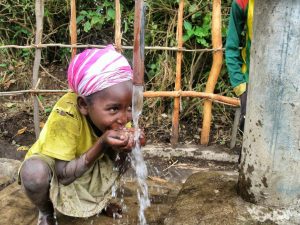
|
WELL REHABILITATION SITE SUMMARY |
|||||||||
|
County |
Village |
GPS Coordinates |
Elevation (m) |
Depth (m) |
Static Water Level (m) |
Pump Type |
Pump Depth (m) |
Well Yield (L/s) |
|
|
UTM East |
UTM North |
||||||||
| Aruma | Wuchale (Bure) |
453619 |
771710 |
1708 |
12 |
6 |
Afridev |
10 |
1.6 |
| Aruma | Megenano |
451660 |
771487 |
1701 |
14 |
6 |
Afridev |
13 |
1.6 |
| Edu | Lomiche 2nd |
453508 |
772959 |
1708 |
13 |
7 |
Afridev |
12 |
0.8 |
| Edu | Kube |
452958 |
772767 |
1725 |
14 |
8 |
Afridev |
12 |
0.5 |
| Edu | Lomiche 1st |
453620 |
772458 |
1720 |
14 |
8 |
Afridev |
12 |
0.5 |
Beneficiary Story: Buro Dekemo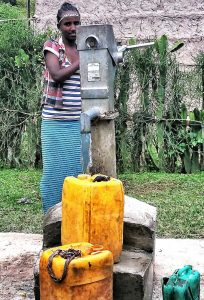
Buro Dekemo is a 16-year-old, grade 9 student in a 9-person household. Buro and her family live in Lomiche 1st village. Her parents are farmers who grow coffee to provide for their families and create a livelihood. She is the eldest daughter and is responsible for fetching water with her mother. She wakes up at dawn to fetch water before the line gets too long.
When the pump broke, she had to carry 20-liter jerry cans for one hour to an unprotected spring. This negatively impacted her school preparation time and there were days that she missed the first period lessons at school. Buro was hoping for a day when the clean water source near her house to be repaired but her community has no means of maintaining the water scheme located in their village. Buro said, “I am so thankful the well is fixed. I can go to school and be there on time to attend my education! A burden has been lifted from our backs. You can see a smile on my face!”
PROJECT IMPACT
• 3,192+: The number of people each day who are receiving the life-giving benefits of clean water in Wondo Genet as a result of well rehabilitations.
• 35: The number of WUC members who were strengthened and trained to manage the rehabbed wells.
• 456: Number of household heads (patriarchs and matriarchs) who were trained in sanitation and hygiene awareness to become teachers that promote better WaSH practices.
We would like to thank everyone who participated in this effort… all the volunteers, villagers, workers and technicians. This wonderful work is a part of our larger Ethiopia Well Rehab Program, and falls under our East Africa Water & Sanitation initiative. Please consider supporting this project, the program, and/or the initiative itself, so more projects like this can be done. There were a lot of pictures taken, and even some cool raw video… much more than can be presented here. If you are interested in seeing more of this stuff, feel free to contact us, and you can look at this YouTube Playlist.
